Eucarya - Study guides, Class notes & Summaries
Looking for the best study guides, study notes and summaries about Eucarya? On this page you'll find 73 study documents about Eucarya.
Page 3 out of 73 results
Sort by

-
Microbiology Review (100% Verified with correct answers)
- Exam (elaborations) • 6 pages • 2023
- Available in package deal
-
- $9.99
- + learn more
Who is known for the use of phenol in surgery? correct answers Joseph Lister Who develioped agar media? correct answers Fannie Hesse Who coined the term "animalcules?" correct answers Antony van Leeuwenhoek Who was Robert Koch's mentor? correct answers Jacob Henle Which two scientists were credited with the original isolation of HIV? correct answers Montagnier and Gallo List Koch's postulates. correct answers 1. The microorganism must be present in every diseased case but abse...
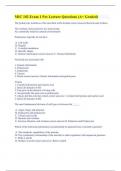
-
MIC 102 Exam 1 Pre Lecture Questions (A+ Graded)
- Exam (elaborations) • 8 pages • 2023
-
- $10.49
- + learn more
The prokaryotic members of the microbial world include correct answers Bacteria and Archaea The Archaea correct answers Are microscopic Are commonly found in extreme environments Prokaryotes typically do not have A. Cell walls B. Flagella C. A nuclear membrane D. Specific shapes E. Genetic information correct answers C. Nuclear Membrane Nucleoids are associated with 1. Genetic information 2. Prokaryotes 3. Eukaryotes 4. Viruses 5. Prions correct answers Genetic i...
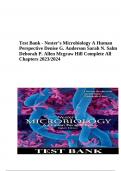
-
Test Bank - Nester’s Microbiology A Human Perspective Denise G. Anderson Sarah N. Salm Deborah P. Allen Mcgraw Hill Complete All Chapters 2023/2024
- Exam (elaborations) • 847 pages • 2023
-
- $30.49
- + learn more
Test Bank - Nester’s Microbiology A Human Perspective Denise G. Anderson Sarah N. Salm Deborah P. Allen Mcgraw Hill Complete All Chapters 2023/2024. The scientist usually considered the first to see microorganisms, which he called "animalcules", was A. Redi. B. van Leeuwenhoek. C. Pasteur. D. Tyndall. Bloom's Level: 1. Remember Learning Outcome: 01.01 Section: 01.01 Topic: History of Microbiology Chapter 01 - Humans and the Microbial World 1-2 2. The word "animalcule" was ...
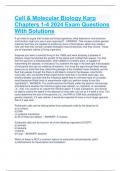
-
Cell & Molecular Biology Karp Chapters 1-4 2024 Exam Questions With Solutions
- Exam (elaborations) • 12 pages • 2023
-
- $11.99
- + learn more
Cell & Molecular Biology Karp Chapters 1-4 2024 Exam Questions With Solutions If you were to argue that viruses are living organisms, what features of viral structure and function might you use in your argument? - ANSWER- That viruses contain genetic material; that they are capable of producing more of themselves, albeit only inside a host cell; that they contain complex biological macromolecules; that they evolve. These are all important criteria of living organisms. Suppose you were ...
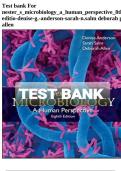
-
Test bank For nester_s_microbiology_a_human_perspective_8th_edition-denise-g.-anderson-sarah-n.salm deborah p. allen
- Exam (elaborations) • 847 pages • 2023
-
- $17.99
- + learn more
Test bank For nester_s_microbiology_a_human_perspective_8th_edition-denise-g.- deborah p. allen. ter 01 - Humans and the Microbial World 1-1 Chapter 01 Humans and the Microbial World Multiple Choice Questions 1. The scientist usually considered the first to see microorganisms, which he called "animalcules", was A. Redi. B. van Leeuwenhoek. C. Pasteur. D. Tyndall. Chapter 01 - Humans and the Microbial World 1-2 2. The word "animalcule" was coined by A. Pasteur. B. van Lee...
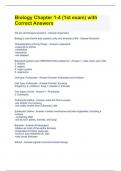
-
Biology Chapter 1-4 (1st exam) with Correct Answers
- Exam (elaborations) • 6 pages • 2023
-
- $9.99
- + learn more
We are all biological systems - Answer-Organisms Biology's core theme and explains unity and diversity of life - Answer-Evolution Characteristics of living things: - Answer--organized -responds to stimuli -metabolize -reproduce -are adapted Biological systems are HIERARCHICAl (related to) - Answer-1. cells- basic unit of life 2. tissues 3. organs 4. organ system 5. organisms Cell type: Prokaryote - Answer-Domain: Eubacteria and Archara Cell Type: Eukaryote - Answer-Domain...
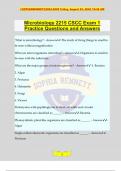
-
Microbiology 2215 CSCC Exam 1 Practice Questions and Answers
- Exam (elaborations) • 12 pages • 2024
-
- $9.99
- + learn more
Microbiology 2215 CSCC Exam 1 Practice Questions and Answers What is microbiology? - Answer️️ -The study of living things to small to be seen without magnification What are microorganisms (microbes)? - Answer️️ -Organisms to small to be seen with the naked eye What are the major groups of microorganisms? - Answer️️ -1. Bacteria 2. Algae 3. Protozoa 4. Helminths 5. Fungi 6. Viruses Prokaryotes with peptidoglycan in their cell walls and circular chromosomes are classified ...

-
INTRODUCTION TO ALGAE SUMMARY NOTES
- Class notes • 10 pages • 2023
-
- $8.49
- + learn more
Introduction to Algae 1-General Characteristics 1-Size Criterion: picoplankton (<1-2 mm), nanoplankton (2-20 mm), microplankton (> 20 mm) 2- Most reproduce asexually 3- Both heterotrophic and autotrophic organisms exist 4- Increased importance of heterotrophy with reduced light and/or nutrients 5-Current estimates suggest that between 4,000 – 5,000 of marine phytoplankton species have been described. Freshwater diversity is probably higher! 6- Phylogeny: Occupy two domains (Bacteria and ...
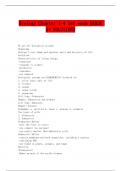
-
Biology Chapter 1-4 1st exam GRADE A+ SOLUTIONS
- Exam (elaborations) • 6 pages • 2024
-
- $9.30
- + learn more
We are all biological systems Organisms Biology's core theme and explains unity and diversity of life Evolution Characteristics of living things: -organized -responds to stimuli -metabolize -reproduce -are adapted Biological systems are HIERARCHICAl (related to) 1. cells- basic unit of life 2. tissues 3. organs 4. organ system 5. organisms Cell type: Prokaryote Domain: Eubacteria and Archara Cell Type: Eukaryote Domain: Eucarya Kingdoms: a. protista b. fungi c. plantae d. an...

-
Ohio University bio 1010 exam 1 2022
- Exam (elaborations) • 5 pages • 2022
-
- $10.49
- + learn more
hat is science? Seeking answer to questions about the natural world Levels of organization Cells, tissue, organisms, population, communities, ecosystem Three Domains Archea, Eucarya, Bacteria binomial nomenclature A system for giving each organism a two-word scientific name that consists of the genus name followed by the species name DNA the genetic makeup of a living thing. It is found in the cells and is unique to each person Cell theory states that all living t...

Did you know that on average a seller on Stuvia earns $82 per month selling study resources? Hmm, hint, hint. Discover all about earning on Stuvia


